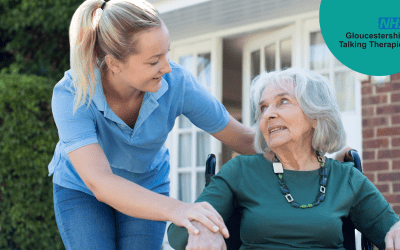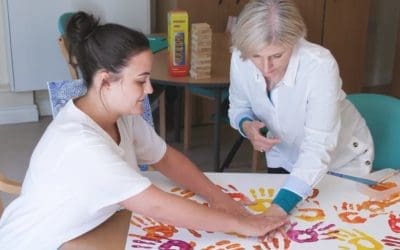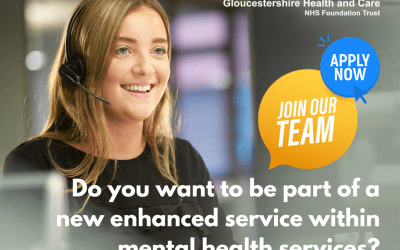You may have heard of a new initiative called Right Care, Right Person, which may change the way police and health partners respond to mental health emergencies in the future. The NHS in Gloucestershire is committed to working alongside the emergency services to make sure anyone with urgent and emergency mental health needs can be treated safely and compassionately.
Ensuring those suffering from acute (sudden and serious) mental illness and crisis in Gloucestershire can access the care they need promptly and in the right place is the focus of our approach which is supported by teams across healthcare and partner organisations.
How the NHS in Gloucestershire supports those in need of emergency mental health support
Our partnership work with Gloucestershire Constabulary is an important part of the way we support different types of mental health crisis or emergency need. Patients and their families can access emergency support in a number of ways including:
- Crisis line – Dial 111 and select option 2, open 24 hours a day, seven days a week
- Visit www.ghc.nhs.uk/crisis
If you feel there is an immediate danger to life to yourself or others you should dial 999 or attend your nearest Accident and Emergency Department.
What happens when you call the Crisis line?
If you call the Crisis Resolution and Home Treatment Team you will be asked to select one of three options relating to where in Gloucestershire you are calling from. Trained healthcare professionals will talk with you about your circumstances (or those of the person you are calling about), how you are feeling and work out the best options to support you.
The team is focused on making sure each person gets the care they need from the people who are best placed to help, this means that they may need to involve others such as the ambulance or police service.
How the NHS in Gloucestershire works with Gloucestershire Constabulary
Gloucestershire already has a strong track record of joint working between police and NHS services, to support those facing a mental health crisis or who need acute emergency care.
This includes:
- A joint working group (Inter-Agency Monitoring Group) which involves professionals from mental health services, the police, the voluntary and community sector, local councils and other areas of the NHS. This group oversees some of the joint projects aimed at supporting those in crisis.
- A specialist NHS mental health team operating out of Gloucestershire Constabulary’s Waterwells HQ and a Mental Health Rapid Respond vehicle. This allows health professionals to treat those in crisis quickly and means those in need of emergency care can access it in a safe environment.
- A mental health response desk, staffed by South Western Ambulance Service and funded by NHS Gloucestershire to take mental health calls and ensure those in crisis can access treatment quickly.
Why the police may attend if someone is in crisis
The police are sometimes called to attend incidents where a person is experiencing an acute mental health crisis. This is often to protect public safety, or the safety of the person themselves, or to prevent a crime. For example, someone may be at risk of coming to physical harm, property may be damaged or access to an area needs to be restricted. Officers work alongside paramedics and medical professionals to ensure the safety of the public and the person in crisis.
In certain circumstances it may be necessary for the police to detain a person under the Mental Health Act (section 136) if they meet certain criteria. The purpose of this is for the person to be assessed. This assessment is carried out by an Approved Mental Health professional and two Doctors who are approved under Section12 of the Mental Health Act. In Gloucestershire this is normally carried out at the Maxwell Centre which is on the Wotton Lawn Hospital site.
What to do if you find someone in mental health crisis
It can be confusing and sometimes frightening if someone you love is facing an acute mental health emergency. It can be especially scary if you find someone in crisis and do not know how to help them. If you or someone else needs help in a mental health crisis, you can call the crisis line by dialing 111 and selecting option 2.
If you feel there is an immediate danger to life to yourself or others you should dial 999 or attend your nearest Accident and Emergency Department.
What are my rights and the rights of carers under the Mental Health Act?
The Mental Health Act is a law and the rights you have within this are outlined here: Mental Health Act (easy read) – NHS (www.nhs.uk)
Under the Mental Health Act, patients are allocated a ‘Nearest Relative’. This may be your next of kin or a relative, but it doesn’t need to be. The Mental Health Act defines who your ‘Nearest Relative’ is and an Approved Mental Health Professional decides who this is depending on the circumstances. You are not able to choose unless you go to court.
Your ‘Nearest Relative’ has the right to information and can ask for you to be assessed, under the Mental Health Act or discharged. You can read more about the Mental Health Act, your rights and the rights of carers here: Mental Health Act (easy read) – NHS (www.nhs.uk)
What will change with the introduction of Right Care, Right Person?
At the moment, discussions are still ongoing between Gloucestershire Police and local health partners. Any changes will need to be fully agreed by all partners to ensure a safe transition into any new arrangements and these will be shared in due course.
Our commitment to providing joined up support for those in need of crisis care will not change and we will continue to treat people in a safe, compassionate and appropriate way.




